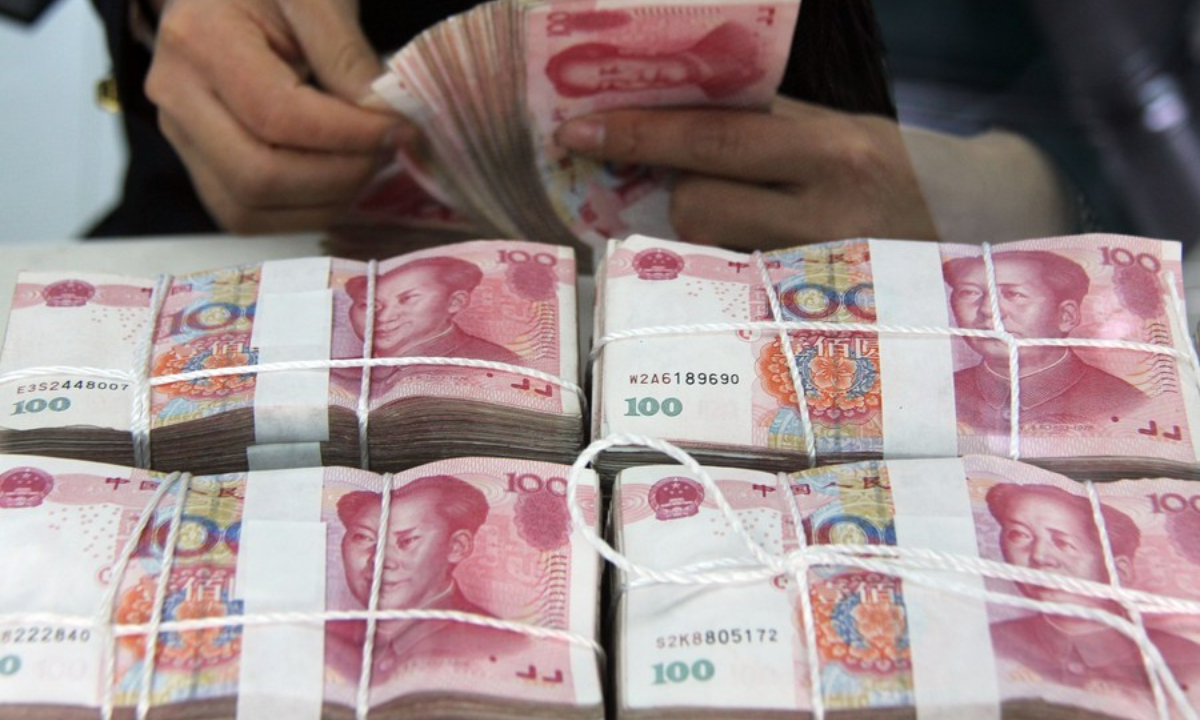
File photo shows a worker counts Chinese currency Renminbi banknotes at a bank in Tancheng County of Linyi City, east China's Shandong Province. Photo:Xinhua
A Russian trust company will reportedly establish an open-ended equity fund to invest in Chinese equities, the latest example of overseas investors' rush to hold more of Chinese financial assets, attracted by their stable yields.
According to sputniknews.com, RB Capital, a Russian trust company, has started to set up an open-ended equity investment fund named RB Capital Chinese Assets.
The fund is expected to invest in the stocks of Chinese companies listed on the Hong Kong and St. Petersburg stock markets, as well as yuan-denominated bonds traded at the Moscow Exchange. It will be the first retail fund to specialize in investing in Chinese companies' bonds traded at the Moscow Exchange, the report noted.
Shares of nearly 60 companies listed in Hong Kong can be traded on the Russian exchange, including Alibaba, Xiaomi and China National Petroleum Corp.
The decision by Russian investors, who so far haven't been active in outbound investment in emerging markets, reflects Chinese financial assets' appeal to global investors, as well as Russia's shift of outbound investment under the impact of broad Western sanctions, experts said.
"Against the backdrop of intensifying global financial market volatility, the resilience of China's capital markets is attracting more overseas investors. This combination makes the Chinese equities market increasingly attractive to Russian investors, especially Russian trusts that often allocate funds to global financial assets," Chen Jia, an independent research fellow on international strategy, told the Global Times on Sunday.
According to Chen, it's the best option for Russian investors if they want to ensure their financial assets' global allocation by participating in China's dual circulation economic growth pattern and capital market connectivity.
"Seen from a long-term perspective, if Russia wants to thoroughly share in China's development dividend, it should increase its investment in China," he noted.
It isn't just Russian investors who are seeking to hold more of Chinese financial assets. Recently, Credit Suisse announced that it had struck a deal to buy out its local partner in a Chinese securities joint venture, making the venture the third wholly foreign-owned securities company in China after JP Morgan Securities (China) Co and Goldman Sachs Gao Hua Securities Co.
Dong Shaopeng, a senior research fellow at the Chongyang Institute for Financial Studies at Renmin University of China, told the Global Times that China's bond assets are the most stable, backed by China's economic resilience.
According to a Bloomberg report, UK money manager Abrdn Plc may buy Chinese debt again after selling out three months ago, as a result of rising yields.
The report noted that China's government bonds were on track to lose 8.5 percent this year based on a Bloomberg index, but that's less than the 15 percent level for US Treasuries.
Because of such advantages as well as China's continuous efforts to open up, the trend will likely grow for overseas capital to flow into the domestic financial markets, experts said.
"With China's political stability, strong supply chain, huge consumption market and economic resilience, it is expected that foreign investment in Chinese financial assets will steadily grow in the next few years," Dong said.
According to the Shanghai Securities News, the China Securities Regulatory Commission is formulating specific short-term trading systems for foreign investors to facilitate their investment in the A-share market.
Chen Jia noted that as China's trade pattern has undergone tremendous changes in recent years, and ASEAN has become China's largest trade partner, China's investment partners might also upgrade to attract more investment capital from the new partners.
He noted that the energy trade and digital currency partnership between China and Russia offer a new direction for the yuan's internationalization, and Russian capital will likely become an important part of China's inbound investment.




